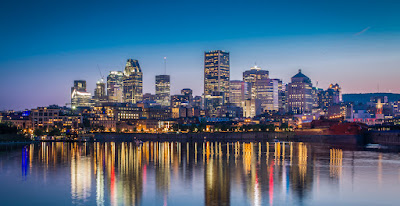Montreal, the vibrant and culturally rich metropolis nestled in the province of Quebec, boasts a dynamic real estate landscape. Shaped by its historical significance, diverse neighborhoods, and economic evolution, Montreal's housing market is a fascinating blend of tradition and innovation. In this two-part blog series, we'll dive into the current real estate trends that define Montreal, providing insights for potential homebuyers, investors, and anyone curious about the city's property market.
Historical Roots and Modern Flourish
Montreal's real estate trends are a reflection of its intricate history and ongoing development. From its iconic Old Port to its bustling downtown core, the city showcases a harmonious blend of old-world charm and modern architecture.
Trend 1: Diverse Neighborhoods, Diverse Demand Montreal is composed of an array of neighborhoods, each with its own distinct character and appeal. From the artistic enclave of Plateau-Mont-Royal to the upscale Westmount, these diverse neighborhoods attract a wide spectrum of buyers and renters.
Trend 2: Strong Rental Market Montreal's rental market is a significant aspect of its real estate landscape. The city's numerous universities and colleges attract students from around the world, driving demand for rental properties. The trend of multi-generational households and the preference for urban living also contribute to the robust rental sector.
Economic Factors and Housing Dynamics
Montreal's economy has undergone transformations over the years, influencing the city's real estate trends. Factors like employment opportunities, immigration patterns, and economic growth play a pivotal role in shaping the housing market.
Trend 3: Tech Industry Growth Montreal has become a burgeoning tech hub, attracting both tech giants and startups alike. This influx of tech professionals has led to increased demand for housing, particularly in neighborhoods close to tech centers and innovation districts.
Trend 4: Immigrant Magnet The city's diverse and inclusive atmosphere makes it a magnet for immigrants from around the world. This population growth contributes to housing demand, with newcomers seeking accommodation options that cater to their preferences and lifestyles.
Cultural Heritage and Lifestyle Appeal
Montreal's cultural heritage is celebrated through its festivals, art scenes, and culinary offerings. These factors, along with its quality of life, have a profound impact on the city's real estate trends.
Trend 5: Urban Revitalization Several areas of Montreal have experienced urban revitalization efforts, breathing new life into historical spaces. These rejuvenated neighborhoods attract buyers and renters who appreciate the mix of modern amenities and historical charm.
Trend 6: Condo Boom Montreal's skyline has evolved with the proliferation of condominium developments. This trend caters to the growing demand for urban living and offers a range of housing options for both young professionals and downsizing empty nesters.
Cultural Richness and Lifestyle Appeal
Montreal's reputation as a cultural hub extends beyond its festivals and arts scene. The city's lifestyle appeal and unique cultural dynamics significantly impact its real estate trends.
Trend 7: Bilingual Identity Montreal's bilingual nature, with English and French coexisting, adds to its global appeal. For many, the opportunity to experience a bilingual lifestyle is a significant draw, influencing their choice of neighborhood and housing.
Trend 8: Creative and Artistic Enclaves The city's creative and artistic communities have carved out distinct neighborhoods with their own vibrant identities. Areas like Mile End and Griffintown attract individuals who value artistic expression, contributing to the unique character of Montreal's housing market.
Sustainable Development and Urban Planning
Montreal places a strong emphasis on sustainable development and urban planning, impacting the way the city grows and evolves.
Trend 9: Green Initiatives Montreal's commitment to sustainability is evident in its green initiatives and urban planning strategies. This focus on environmentally friendly practices translates to housing trends, with a growing interest in energy-efficient and eco-friendly properties.
Trend 10: Public Transportation Accessibility The city's extensive public transportation system, including the Metro and buses, plays a significant role in housing decisions. Proximity to transit hubs can increase a neighborhood's desirability, especially among those who prefer a car-free lifestyle.
Market Affordability and Investment Opportunities
Montreal's affordability relative to other major Canadian cities has garnered attention from both homebuyers and investors.
Trend 11: Affordable Housing Options Compared to cities like Toronto and Vancouver, Montreal offers more affordable housing options. This affordability attracts both first-time homebuyers and investors seeking rental properties with potential for stable returns.
Trend 12: Investment Interest Montreal's real estate market has piqued the interest of national and international investors. Favorable property prices, potential for appreciation, and the city's overall growth make it an attractive destination for those looking to invest in real estate.
Conclusion
As we conclude our exploration of Montreal's real estate trends, it's clear that the city's character and dynamism permeate every facet of its housing market. From its diverse neighborhoods and robust rental market to its growing tech industry and emphasis on sustainability, Montreal's real estate landscape is a tapestry woven with cultural richness, economic evolution, and lifestyle preferences.
Whether you're considering becoming a Montreal resident, making an investment, or simply intrigued by the interplay of factors shaping the city's property market, understanding these trends is key to making informed decisions. Keep in mind that the real estate landscape is ever-evolving, so staying connected to local market data and seeking advice from experts is essential for anyone looking to engage with Montreal's dynamic housing market.










